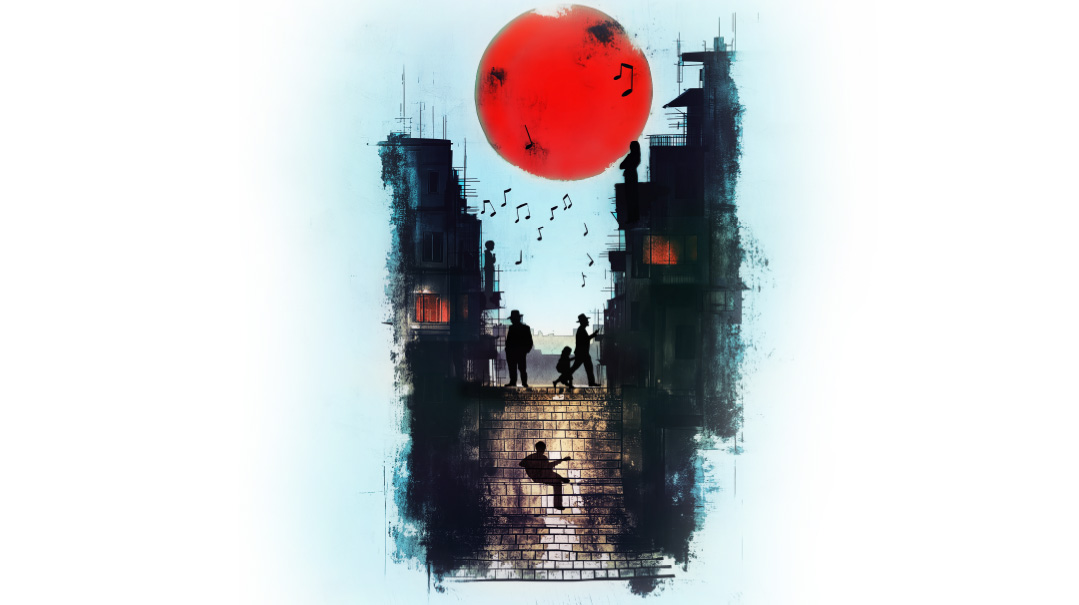Last Stop: Chapter 11
| May 2, 2023“I think Yudi’s past chances, isn’t he?” Chana says reasonably. “You have a blind spot for this boy, Naftali”

Naftali drives with a single-minded focus that he’s never had before. The world seems to blur around him, all of it coming down to a single point of vision — straight ahead, back to Ohr Gershon. Back to whatever Yudi is about to do.
He calls Chana instinctively, grasping for something to hold onto beyond the sick sensation in his stomach. “I’m going to be late today,” he says. “Yudi never got onto the afternoon bus.”
Chana sounds distracted. There are children fighting in the background, and Naftali can hear the oven beeping. “Do you think he ran away?” she asks.
“No.” Naftali had wondered about that earlier, but he’s sure now. “He wouldn’t have gone through a whole day of school if he were planning to run away.” And there’s no point, if it’s about being missed, because his parents are traveling again. Yudi has no shortage of independence.
“I’m worried he… I think he might be…” He doesn’t know what to say, how to convey his nebulous fears of what Yudi might be up to. He only knows that there’s going to be trouble, and Yudi will be at the center of it.
“I have to find him,” he says at last.
Chana is quiet for a moment, the chaos in the background more marked in the absence of a response. “I think you should call Eliezer.”
“He won’t listen.” Naftali is well aware of this by now, and he shudders to think of what Eliezer might do if he discovers whatever Yudi’s doing. “Or he’ll go in with guns blazing and Yudi won’t have a chance to—”
“I think Yudi’s past chances, isn’t he?” Chana says reasonably. “You have a blind spot for this boy, Naftali. But if he’s up to something at school…” Her voice trails off. “I think you should call Eliezer,” she says again.
“I’ve got it under control.” Maybe he does have a blind spot for Yudi, but that’s also why he’s sure that he can get through to Yudi when Eliezer can’t. “Eliezer isn’t—”
“Let me talk to Rivky,” Chana says before Naftali can finish. “You’re too close to this situation. Maybe she’ll have some good ideas.”
Naftali’s fingers tense on the wheel. “She’ll call Eliezer,” he says, weighed down with dread at the idea.
“This is Eliezer’s job,” Chana says, her voice gentle. “I trust you. I know you care about this boy. But everything that you’ve told me about him makes me worry that he’ll take advantage of you.”
Naftali has no rejoinder, no defense against that point. Chana sighs. “I’ve got to go — Mindy and Shayna are at it again.” She hangs up, voice already raised at one of the girls.
Naftali stares ahead of him, the road narrowing even more. Finding Yudi in the midst of a disaster will be bad enough. But if Rivky decides to get involved… Eliezer finding Yudi will be even worse. He has to get there first.
He handles his bus like a racehorse, urging speed and agility from it, and the bus barrels through the streets as it roars toward the school. He pulls over next to Ohr Gershon in mere minutes, flies out of the bus and into the building, and hurries through the hallways, searching for any sign of the missing boy. “Yudi? Yudi? Yudi!”
The school is nearly empty. The custodians have already finished their jobs, and the office lights are dim. The last of the secretaries is still in the reception area, packing up her bag, and she heads out just as Naftali walks past. Naftali rounds a corner and heads into a stairwell. “Yudi!”
He climbs up to the fourth floor, to the upstairs beis medrash, and then to Yudi’s classroom. Empty. He’s stopped calling Yudi’s name, is no longer certain that Yudi is in the building, and he’s beginning to feel foolish. If Rivky updates him — and she probably will — Eliezer is going to be irritated at the….
Eliezer.
With a sinking sensation, Naftali crosses the hall, and tries the door to the fourth-floor offices. It should be locked — it’s always locked by this time of night — but someone has carefully wedged a stapler in the door, holding it open. The room is dark, and Naftali slips inside, glancing around.
Eliezer’s office is down the hallway and to the left, and there’s a flickering light reflecting off the wall opposite it, the dance of the shadows leaving no doubt in Naftali’s mind. He walks swiftly, quietly, down the hallway.
And there is Yudi, standing over Eliezer’s desk. His knapsack is open and reveals what he’s been clinging to all day — a damp shopping bag, emptied now, and a pile of rags on the desk in front of him that fill the room with the stench of motor oil. Yudi stares down at them, his lighter in one hand.
In the other, he holds a gift Eliezer had gotten from Rivky, a wax miniature of Ohr Gershon that’s meant to be a Havdalah candle. It’s burning slowly, casting the room in eerie, orange-tinged shadow, and Yudi’s fingers shake as he clenches it.
He looks up as Naftali enters. There’s a little shiver of surprise, a moment in which everything seems to stand still. When he meets Naftali’s gaze, his expression turns wild and dark, and he shakes his head. “Go away, Naftali,” he says. “Stay out of this.”
Naftali remembers Yudi on the side of the road, his face hooded with danger. Everything burns eventually. Everything turns into the same ash. Tonight, he puts that to the test.
“I know you think that this will…” Naftali doesn’t finish the sentence, but he can guess. Humble Eliezer. Teach him a lesson. “But you’ll burn down the school if you set that desk on fire,” he says, his voice choked.
“Maybe.” Yudi looks fierce. “Good. That’s what Rabbi Hartman deserves. That’s what everyone here deserves.
“They don’t think I’d do it, you know,” he says, and his voice rises. “They shove me around like I’m just… like we’re all just their minions. Like they can do whatever they want to students because what are we going to do? Complain to our mommies and daddies?” His fingers clench the candle more tightly. A little trimming — a loop of what was once a gate on the wax miniature — falls to the desk. “Don’t deny it. You see what I see. You know how they treat me here.”
Naftali has never been one for conflict, has avoided it wherever he can, and a part of him still wants to run from this room and never return. To back out of a situation that can only end badly and leave Yudi and Eliezer to the disaster that they’re embroiled in. He wills himself to stand firm, mouth agape and horrified. After a long silence, Yudi, looking grudgingly ashamed, says, “It won’t spread. I can keep it under control.”
“Yudi.” Naftali’s skin feels electrified from the pressure in the room, the heat licking at Yudi’s hands, the rags waiting to burn. There are so many of them — enough that a single flame can create a raging inferno. “Yudi, please,” he says, because he has nothing else to offer him. He maps the distance to the desk and knows that he won’t be able to charge at Yudi, not without Yudi dropping the candle. “You won’t be able to come back from this.”
He sounds like Eliezer, he thinks, the tension making his voice taut and stern, and Yudi’s eyes seem to shutter with his tone. He clears his throat. For all that Yudi has caught him by unpleasant surprise with this stunt, Naftali still believes that Eliezer’s way isn’t the right route for this student.
“What do you want?” Naftali asks, and he keeps his voice calm, gentle. “What are you trying to accomplish here?”
Yudi’s mouth firms. “I’m going to make him pay. I don’t care if I get expelled,” he says. “I don’t care if Rabbi Hartman calls the cops on me or—”
Naftali cuts him off before Yudi can get any more worked up. “I know what you don’t care about,” he says carefully, still aware that he’s handling a ticking time bomb. Yudi’s hand shakes, the wax melting into a pale puddle, pooling on his skin. “I know that you feel like you have nothing left to lose. But what do you want?”
So much of what he’s seen of Yudi has been Yudi lashing out, Yudi sulking, Yudi’s litany of a dozen things he hates about his every day. He has no idea what it is that might make Yudi feel content.
Yudi stares at him with wild, uncertain eyes, and Naftali is sure that he doesn’t know, either.
“I know what I want for you,” Naftali says quietly. “What I wanted when I was your age. I wanted to be seen. To be known. I wanted to matter. And I never felt like I did, not until I got out of yeshivah and created my own family. Sometimes I still only feel like I matter when I’m on the bus.”
The world whirls around him, madcap and full of people racing from destination to destination in desperate attempts to find satisfaction. Naftali likes his slow yellow behemoth, likes going to the same places over and over again. He’s content to transport others.
Yudi is listening, eyes fixed on Naftali, and Naftali is afraid of the responsibility that comes with Yudi’s attention. Naftali is Yudi’s only anchor right now, and he isn’t equipped for this. He’s a bus driver. He knows nothing of psychology, of how to navigate the twisted labyrinths of a tortured soul. He can’t talk down a child ready to do the unforgivable.
But there is no one else.
“Give me the candle,” Naftali says, reaching out an arm. Yudi stands, frozen, face raw with fear and uncertainty. “You don’t want to do this, do you? This isn’t how you matter. I know who you are.” He thinks back to their bus rides, to the boy he’d liked so much. “You’re smart and bold and funny, and you deserve much more than to be defined by this single incident—”
“I will be,” Yudi says. His voice is hoarse now, more panicky than it had been before, and Naftali knows that the realization of what he’s about to do is beginning to set in. “This is it for me. Even if I don’t — you’ll have to tell everyone. You’ll have to tell him. I don’t have a choice.”
Naftali breathes. Progress, slow and steady. “You have a choice,” he murmurs. “It might be the most important choice you ever make. Give me the candle.” And, with a surge of unfettered honesty, “If for no other reason, do it because my brother is going to be insufferable if I’m wrong about you.”
Yudi’s lips twitch. Something calms in his stance, the terror muted by a slow certainty, and the boy nods slowly. “Okay,” he says. “Okay—”
As Naftali steps forward with a rush of relief to take the candle, two terrible, irreversible things happen in quick succession.
Eliezer comes tearing into the office complex, roaring Yudi’s name. “YUDI! YEHUDAH STEIN!”
And Yudi, face stricken with startled horror, drops the candle onto the mass of flammable rags on the desk.
They have a single instant. An instant, just long enough for Naftali to hurtle forward at the desk, just long enough for him to throw himself — not at the desk, the desk is beyond hope, the desk is soaked through with accelerants and a single flame will destroy it — at Yudi.
They careen toward the far side of the room, Yudi stumbling and slipping and Naftali seizing him, throwing him backward to safety.
Naftali catches a flash of Eliezer, framed in the doorway, his eyes roiling with fury.
And the desk explodes in a mass of sparks and flames and splintered wood.
to be continued…
(Originally featured in Mishpacha, Issue 959)
Oops! We could not locate your form.



